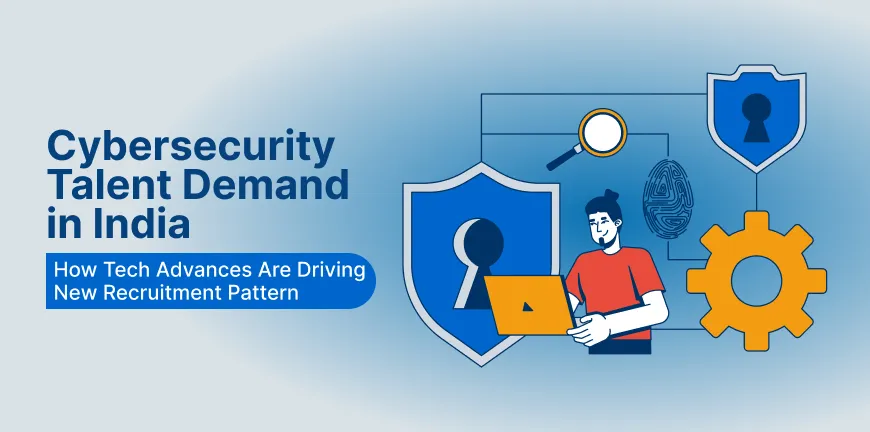
What is Workplace Ethics? Definition, Importance, Examples
03/11/2025
HR‑Tech Platforms in India: A Look at Tools Disrupting Traditional Recruitment
03/11/2025The digital revolution in India has given the recruitment landscape a sudden twist, and there has been an incredible shift as technological advancements have created monsters known as cybersecurity threats. As John T. Chambers, former CEO of Cisco Systems, has said, “There are only two types of companies: those that have been hacked and those who don’t know they have been hacked.”
These threats are significantly intensifying and require intervention and management by well-trained cybersecurity professionals. Organizations are trying to strengthen their shields and are focusing on recruiting skilled professionals with expertise in cybersecurity.
Threats Powering Recruitment Demand
India has become the primary target for cybercriminals, who are leaders in global malware attacks. According to reports, the Data Security Council of India (DSCI) + Seqrite (“India Cyber Threat Report 2024/25”): India had about 369 million malware detections in 2024 across 8.44 million installations. The rise in penetration of AI-powered ransomware and phishing campaigns has blown the situation out of proportion, resulting in the dire need for skilled cybersecurity professionals.
Let us look at some of the threat categories leading organizations to hire niche professionals:
1. Surge in attack volume and sophisticated methods
It has been observed that there has been a constant rise in the expansion of a varied number of malware across devices. Attackers have started relying on technologies like AI and ML and other advanced methods to elude detection. There is also an incredibly high penetration of the attack surface through various platforms.
2. Cloud Adoption and Flexible Modes
Companies today are shifting their data to cloud platforms, losing control over some parts of their systems. The infrastructure is operated by the cloud provider. Hence, organizations must safeguard the data and systems that are under their control by recruiting promising cloud security experts.
Another aspect is that systems become complex as there is a rise in hybrid and remote work, and there is an array of devices connected to varied business networks, creating a need for a robust security system.
3. Enhanced Rules, Compliance, and Privacy pressure
Companies today are looking at hiring risk and compliance experts, as businesses are constantly moving their sensitive data, and they must adhere to stringent laws to protect client data and information. To ensure proper compliance with these regulations, there is a demand for risk and compliance experts.
4. Skill Gap and Dearth of Internal Capability
In India, many organizations lack well-trained cybersecurity workers. There are scanty options and provisions for training professionals to help companies combat the growing cybersecurity risks.
5. Inadequate Infrastructure
Several organizations do not have the required infrastructure and are unprepared to face the risks that are likely to be generated by the threats, and as more and more sectors get targeted, it is imperative to build cyber defence structures and robust incident management systems.
Trending Cybersecurity Roles
The evolving threat-laden environment has made way for niche cybersecurity roles like
- AI Security Engineers: Experts in integrating AI tools to enhance threat detection and response mechanisms.
- Cloud Security Engineers: Professionals adept at securing cloud infrastructures, with a reported 45% of organizations having unfilled cloud security roles
- Mobile Threat Analysts: Specialists focusing on securing mobile platforms against emerging threats.
- Crowdsourced Red Team Specialists: Professionals conducting simulated attacks to identify vulnerabilities in systems.
These roles are essentially supposed to be a mix of possessing technical expertise and hands-on experience, focusing on the continuous need for skill upgradation.
What This Means for Organisations & Job-Seekers in India
For Organisations
- Recruiters and organizations must act fast and smart. They cannot afford to wait for a major disruption to happen, considering the shortage. They must invest in developing talent banks and pipelines.
- Businesses must focus on providing substantial training and courses for the upgradation of the existing manpower. There must be initiatives to partner with academic institutions and offer apprenticeship and internship programs.
- Expansion of the network in terms of hiring can be beneficial for organizations. They must consider recruiting professionals from other domains and then train them for the roles related to cybersecurity.
- Cyber is not exclusively technical these days, and organizations must make candidates understand how it affects and progresses business, the risks involved, and the rules and policies that should be adhered to in this domain.
- Companies must now stop restricting their recruitment game to metro cities and expand their talent base by looking at Tier 2 and 3 hubs.
For Job-Seekers
- Potential job seekers and professionals must emphasize developing their knowledge in niche skills rather than only focusing on general IT support systems.
- Candidates must focus on getting certifications and learn practical skills to showcase their hands-on experience.
- They must concentrate on building soft business skills to communicate clearly and explain technical terminologies to non-tech individuals, like business partners, stakeholders, etc.
- Candidates must watch out for roles and opportunities from not just major centres but also from smaller cities. They must be aware of various geographies and widening scopes.
- The learning cycle must be on constantly, as cyber threats can evolve anytime, and gaining necessary knowledge and updating oneself is important.
Trends to Watch Out for
Let us check out some of the emerging trends that will craft the future of recruitment in the cybersecurity space:
- There is an increasing need for robust security for AI/ML and Generative AI as more and more organisations are adopting the technologies.
- There is a rise in cloud-related cyber roles as more than half of an organisation’s workload is migrating to cloud systems, making way for roles like those of security engineers.
- Cybersecurity is not just an IT problem anymore; it is an issue that can affect businesses and put them at risk. Organisations are focusing on developing cybersecurity leadership roles to govern and manage risks.
- With the rise of remote and hybrid work modes, there will be a plethora of opportunities to work in global work models and remote security operations, opening interesting avenues.
- Cyber roles will certainly penetrate tier 2 and 3 cities with the rapid expansion of tech services into these cities along the metros. This will enable local or remote access without shifting cities or countries.
With the world embracing evolving digital metamorphosis, India’s digital landscape is also not behind and is transforming significantly.
These advancements heighten the propensity and make cybersecurity concerns real, resulting in unprecedented demand for skilled cybersecurity professionals that is likely to be critical by 2026. According to research, India requires over 1.5 million cybersecurity professionals by 2026 to support its growing digital ecosystems. However, there is a current shortage of around 800,000 professionals.

Amit Saproo
Amit Saproo is the Head of Operations at ALP Consulting with nearly 17 years of experience in Executive Search, RPO, Leadership, and IT & Engineering recruitment. He leads nationwide recruitment programs across Technology, BFSI, and R&D domains, driving strategic hiring solutions for diverse client needs. Amit excels in building and managing high-performance teams that deliver scalable, end-to-end recruitment and consulting services.



